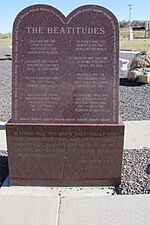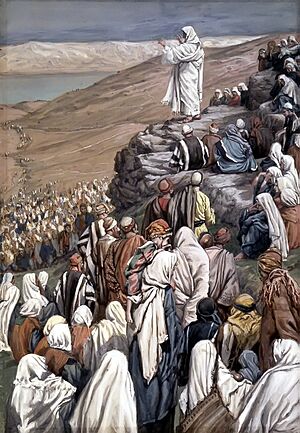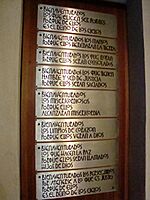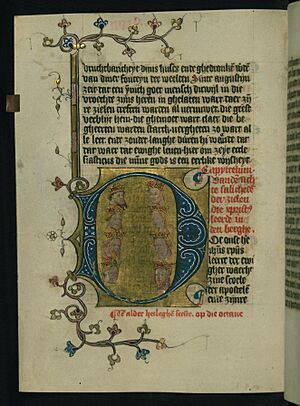Beatitudes facts for kids
The Beatitudes are a famous set of teachings from Jesus. They are like special blessings. Jesus shared these blessings in two important speeches. One is called the Sermon on the Mount in the Gospel of Matthew. The other is the Sermon on the Plain in the Gospel of Luke. These teachings tell us what kinds of attitudes and actions lead to true happiness and a good life.
Contents
What Are the Beatitudes?
The word "Beatitude" comes from a Latin word, beātī. This word means "blessed" or "truly happy." In the original Greek language, the word was makarioi, which means the same thing. So, when Jesus said, "Blessed are the poor in spirit," he meant "Truly happy are the poor in spirit."
These blessings describe people who live in a certain way. Jesus said these people would receive wonderful rewards. Most experts agree there are eight main Beatitudes. They follow a simple idea: Jesus says that people who might seem unlucky are actually very blessed.
The Beatitudes in Matthew's Gospel
In the Gospel of Matthew, Jesus shared nine Beatitudes. These are found in chapter 5, verses 3-12. They are part of his famous Sermon on the Mount.

Eight Special Blessings
Here are the Beatitudes from Matthew, explained in a simple way:
- Blessed are the poor in spirit: This means people who know they need God's help. They are humble. Jesus said they will receive the Kingdom of Heaven.
- Blessed are those who mourn: This refers to people who are sad about their own mistakes or the world's problems. They will find comfort.
- Blessed are the meek: These are people who are gentle and patient, not proud or aggressive. They will "inherit the Earth," meaning they will have a lasting place.
- Blessed are those who hunger and thirst for righteousness: This means people who deeply want to do what is right and fair. They will be satisfied.
- Blessed are the merciful: These are people who show kindness and forgiveness to others. They will also receive mercy.
- Blessed are the pure in heart: This means people whose thoughts and intentions are good and honest. They will "see God."
- Blessed are the peacemakers: These are people who work to bring peace and stop arguments. They will be called "Children of God."
- Blessed are those who are persecuted because of righteousness: This means people who suffer for doing what is right. They will also receive the Kingdom of Heaven.
Matthew's Gospel also includes a ninth blessing (verses 11-12). It says, "Blessed are you when people insult you, persecute you and falsely say all kinds of evil against you because of Me." This special blessing is for Jesus's followers. It encourages them to be happy even when facing difficulties for their faith.
The Beatitudes in Luke's Gospel
The Gospel of Luke also shares some of Jesus's blessings. These are found in chapter 6, verses 20-22. They are part of a speech called the Sermon on the Plain. Luke's version is shorter than Matthew's. It focuses more on people who are actually poor or suffering.
Four Blessings and Four Warnings
Here are the four Beatitudes from Luke:
- Blessed are you who are poor: For you will receive the Kingdom of God.
- Blessed are you who hunger now: For you will be satisfied.
- Blessed are you who weep now: For you will laugh.
- Blessed are you when people hate you, when they exclude you and insult you and reject your name as evil, because of the Son of Man: This means you will have a great reward in heaven.
Luke's Gospel also includes four warnings, or "woes," right after the blessings. These warnings are for people who are rich, well-fed, or popular now. They suggest that these people might face difficulties later if they don't care for others. For example, "Woe to you who are rich, for you have already received your comfort."
Beatitudes in Other Traditions
The idea of blessings and good ways to live appears in many religious texts. For example, the Epistle of James in the New Testament talks about being blessed for staying strong during tough times.
The Book of Mormon, a religious text for the Latter Day Saint movement, also describes Jesus teaching similar blessings in the Americas. These teachings are found in 3 Nephi chapter 12. They are much like the Beatitudes in Matthew's Gospel.
The Baháʼí Faith also has a tablet called the Lawḥ-i-Aqdas. It ends with 21 blessings. One example is: "Blessed the soul that hath been raised to life through My quickening breath and hath gained admittance into My heavenly Kingdom."
Some ideas in the Qur'an, the Bhagavad Gita, and Buddhism also share similar messages. They talk about being humble and kind, much like the Beatitudes.
Modern Beatitudes by Pope Francis
In 2016, Pope Francis suggested six "modern Beatitudes." These are new ways to think about blessings in today's world:
- Blessed are those who stay faithful even when others treat them badly, and they forgive from their heart.
- Blessed are those who notice and help people who are left out or forgotten.
- Blessed are those who see God in everyone and help others find Him too.
- Blessed are those who protect and care for our planet, our common home.
- Blessed are those who give up their own comfort to help others.
- Blessed are those who pray and work for all Christians to be united.
See Also
 In Spanish: Bienaventuranza para niños
In Spanish: Bienaventuranza para niños
- Social Justice
- Divine Mercy
- Life of Jesus in the New Testament
- Mount of Beatitudes
 | Delilah Pierce |
 | Gordon Parks |
 | Augusta Savage |
 | Charles Ethan Porter |




